
Fun Multiplication Math Games & Educational Times Tables Activities for Kids
If you want to teach your child multiplication, then turning calculation into multiplication math games can be the way to go. You will find that your child will learn much faster with any kind of fun math games for kids, as these cool math games will stimulate your child's brain to learn much more effectively.
If your child - like so many other
children - finds it challenging to initially grasp the logic within
math, you may want to try cool math games for kids to help him or
her learn.
Why do kids learn better with cool math games?
Playfulness Is Your Child's Primary Learning Tool
Well, kids learn most effectively while playing!
Anything that is fun for
your child will be easier to learn, which is why fun math games,
free online math games, math multiplication games, printable math
games, math fact games, primary math games, math addition games,
math fraction games, and all kinds of cool math games will stick in
their head much more.
Repetition Is Your Child's Guarantee to Make the Math Stick
Another thing that makes these multiplication games so effective is that your kids will continue to repeat the math problems over and over, as they have to repeat them in order to win the game.The more your child repeats the math problems in the multiplication math games, the easier it will be for them to remember their times tables.
If you want to teach your child math and multiplication using these cool math games, you will find that they will remember what they have learned much more effectively.
Multiplication Math Games Ideas for Teaching Kids Times Tables
If you want to teach your kids some of the multiplication times
tables, here are some great multiplication games you can play to
help them learn:
The 11 Times Table - a Cool Math Game Using Cards
The 11 Times Table is the easiest to learn, at least up until you
reach 11 x 10.
All your kids need to know is that
multiplying 11 by any number is just that number twice.
For
example, 3 times 11 is 33, or 5 times 11 is 55.
A great game
to play is playing highest card draw from a deck of cards. Remove
all the face cards from the deck, and have each child pick a card
from the deck. The person with the highest card has to tell you what
the product of the value of their card is multiplied by 11.
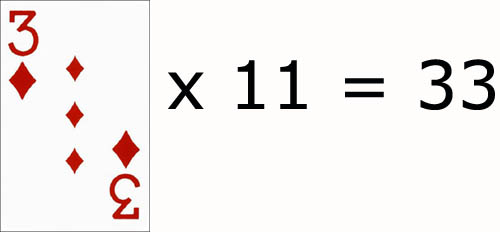
The 9 Times Table - Add Piano Notes for More Fun
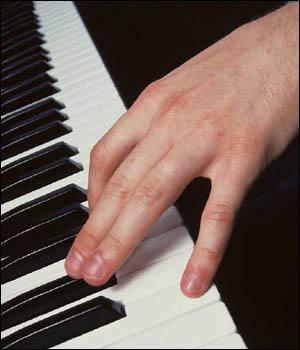 The 9 Times Table is another one
of math multiplication games that is easy to learn, provided your
child knows basic mathematics.
The 9 Times Table is another one
of math multiplication games that is easy to learn, provided your
child knows basic mathematics.
Have your child hold up their hands with all 10 fingers extended straight and their pinky fingers touching.
Bend the thumb of their left hand 9 times 1, and have them count how many fingers there are to the right of their bent finger (9).
Have them straighten their thumb and bend their left index finger for 9 times 2. The fingers to the left of the bent finger will be the tens (1 finger = 10, 3 fingers = 30, etc.), and the fingers to the right equals the ones (3 = 3, 7 = 7).
Have them add the tens on the left of the bent finger and the ones to the right of the bent finger to get their number.
To make it a game, place
your hands on the piano and hit one note at a time. They get to
figure out the problem according to the finger you have bent to hit
the key.
5 Times Table - Use Cards for Surprise and Spontaneity
With the 5 table, basically remember that
every other answer has a 5 in it, and add ten between each odd
number.
For example 1 x 5 = 5, 3 x 5 = 15 (10 +5), and
so on.
You can make a game out of it by having your
child select a number card from a deck of playing cards and
have them multiply that number by 5 to get the answer.
1 Through 6 Tables - Spicing up Multiplication Games with Cards and a Dice
To help your child learn the
multiplication tables of 1 through 6, hand out a deck of cards
(face cards removed) and a dice.
Have them draw a card
(Ace card is 1, the rest are valued according to the number),
and have them multiply the number on their card according to
the number shown on the dice.
(You can use dice with
up to 10 or 12 sides in order to help your child practice
their more complex multiplication tables, or there are dice
with up to 20 sides).
These multiplication math games can help your child
to learn the basic times tables, and you will find that they
can be very effective in helping him or her to practice over
and over until they get the tables correct every time.
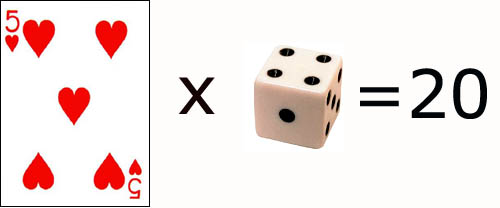
More Fabulous Games to Play for Teaching Kids Multiplication
If your child isn't interested in the
tricks and games above or is just hungry for more, there are a
few more multiplication games that he or she can play in order
to practice their math skills.
Here are a few ideas
for multiplication games that you can try at home or at school:
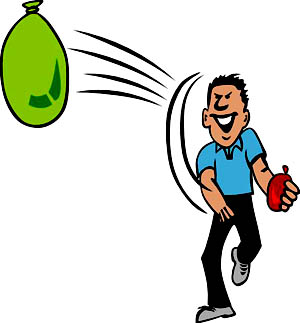 Multiplication Water Fight
Multiplication Water Fight
With this game, line all of your players
up in two lines facing each other.
Give each child a
number (1 through 12), according to their age (the older kids
get the larger numbers).
Yell out a multiplication
problem (3 x 8, 4 x 12, etc.) and the two kids with the
numbers in the problem have to figure it out.
The
first one to figure out the problem gets to squirt the other
player (or the team whose player figured it out gets to throw
water balloons at the other team).
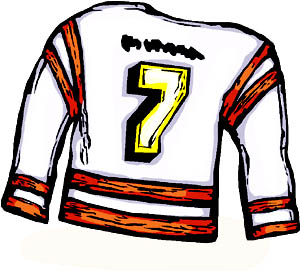 SuperBowl Math Madness
SuperBowl Math Madness
Take all of the numbers from the jerseys
of your favorite football team (can also be basketball,
hockey, etc.) and multiply them with each other to see which
player has the highest number.
You can also do this
with Fantasy Football, with each player making a team of their
ideal football players. The numbers on each jersey are then
multiplied and added up, and the player with the highest
number wins.
Multiplication Pinwheels
Make pinwheels with 12 sections, each
with a different number in the wheel.
Everyone takes a
turn to guess which number the pinwheel will land on, and the
person with the correct guess doesn't have to do a
multiplication problem.
The ones that guessed
incorrectly have to multiply the number they guessed by the
number on the pinwheel, or else lose a point.
Times Table Contest
Just like you would organize a spelling
bee, so too you can organize a multiplication math games times table contest.
Obviously you would tailor the difficulty according to
the ages of the children participating, but you can have the
times tables go as high as the 20 table for a real challenge
for older children.
These are a few ideas of
multiplication games you
can try if you are interested in learning math at home or at
school, and you will find that these games can actually be a
lot of fun if you play them right!
Some Free Online Math Games and Other Math Multiplication Games

When it comes to multiplication math
games, the internet is often a great place to look. There are
literally hundreds of sites that you can check out for simple
math games, but it's always much more fun if you can get the
more advanced games with better graphics.
While you
won't find any multiplication math games up to par with the graphics of the latest
Call of Duty or Assassin's Creed, there are many games with
decent graphics that your kids can have fun playing.
Don't know where to look?
Check out some of these
games to help your child learn his or her multiplication
tables:
 Mathonaire - The Math Version of "Who Wants to Be a
Millionaire?"
Mathonaire - The Math Version of "Who Wants to Be a
Millionaire?"
For those who like the show "Who Wants to
be a Millionaire?", Mathonaire is the game of choice.
This game has tests that range from simple to complex, from
addition to algebra, and they can be a great way to help your
child learn all about their multiplication.
It is made
just like the TV show, making it a great choice for those who
like the game show. Some kids have found the game to be
complex - at least for making mental calculations - but
overall it is one that is guaranteed to be lots of fun.
Math Fighter - Action Game Controlled by Your Math Skills
Pilot a ship and defend your city or
country from the invading forces by doing math problems.
This game will involve using a keyboard to figure out math
problems, as well as clicking on the mouse to aim and fire.
The graphics are actually quite good, and the game is
lots of fun for kids of all ages.
The game usually
starts out slow and easy, but eventually it gets quite
complicated and becomes a challenge for the kids playing the
game.
Math Blaster - An Old Style Vintage Math Experience
Despite the fact that this game is old,
the Math Blaster game series can be a lot of fun.
You
will need to run Windows XP on your computer, but you can
download this game via DOSGames.com.
The difficulty
level can be set, and it can be a fun run through game that
you can probably finish within 30 minutes.
For those
who like vintage video games, these games can provide you with
all the fun in the world.
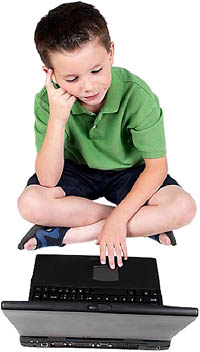 Timez Attack - Using Math to Defeat Monsters
Timez Attack - Using Math to Defeat Monsters
The game is not focused solely on
multiplication, but it is effective at teaching it along with
all the other math skills.
You have all kinds of math
problems that you have to solve, along with logic problems and
puzzles.
Basically the game is that you have to
continue solving problems until you defeat the monsters and
get to the end of the levels.
It will challenge your
kids until they finish it, and it can help them to brush up
and reinforce their math skills.
The only downside to
the game is that it only goes up to the 12 times tables, but
this is not a problem for middle school children.
Multiplication Airplanes - Avoiding the Eagle
In this one of multiplication math games, you will prevent an
airplane from crashing into a high flying eagle.
The
airplane is flying at a good height, but it slowly begins to
descend.
Your child will have to hit the plane by
doing a multiplication problem, and this causes the plane to
ascend once more. If the child hits the eagle, the game is
over.
Stun Attack
In this game, a number of frogs are
trying to eat you, the little ant.
Your children need
to input the solutions to simple multiplication products in
order to stun the frogs and prevent them from flicking out
their tongue and eating the ant.
The game can be set
on easy for novices or fast for the more advanced players, and
it is a perfect way to teach them typing skills as well as
math skills.
Munch Time - Feed the Aliens the Right Food and Solve Their Math Problem
The Munch Time games is for those who
need to practice certain math tables, and it gives you the
ability to choose the tables your child wants to work on.
The aliens will come to the serving counter to get their
lunch, and they will present you with a math problem to solve.
Just like in Diner Dash or any of the other games of
its kind, you can only satisfy the aliens by feeding them the
right food and solving the problem.
The fact that you
can choose the multiplication tables to work on is what makes
this game so great, though it only goes up to the 12 times
tables.
More Multiplication Games for Kids to Make Teaching Math Fun
If you want a few more free
multiplication games that you can use to teach your children
multiplication in a fun way, here are a few more ideas:
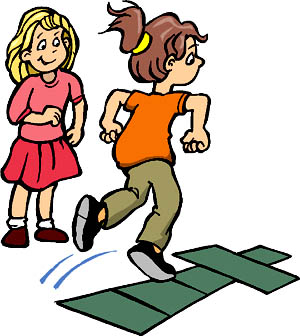 Hopscotch Math Race
Hopscotch Math Race
This type of multiplication math games is great if there is more than one child.
Draw out three lines of hopscotch, and
set one player at each end of the lines.
Call out a
multiplication problem, and see which player is the first to
call out the right answer. That player will move forward one
space, and you will call out another problem.
On and
on it goes until one player makes it all the way to the tenth
space, and that player is the winner.
Math Jeopardy
Call out large numbers that have many
ways of reaching the answer (24, 48, 96, etc.) and play a
Jeopardy game with it.
For example, call out the
number 108, and see which student figures out that you were
trying to find the equation "What is 27 times 4?"
This
is one of multiplication math games makes out a fun way to get your kids thinking creatively, and there
are so many large numbers with many different equations.
Multiplication BINGO
With multiplication bingo, you are
calling out large numbers, and the BINGO card has
multiplication problems on it.
There may be some
numbers that have more than one equation to solve (like 18
with "6 times 3" and "2 times 9").
If the numbers have
more than one equation, both equations are punched out. The
winner is the first person who gets five in a row.
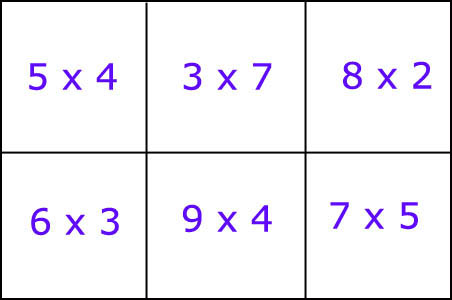
Multiplication Candyland
Rather than playing regular Candyland,
assign each color a number.
Roll the dice to advance a
number of spaces, and have the person call out the equation
with the number on the dice and the number of the color they
land on. (purple is number 6 and the player rolls a 5 to land
on a space: 6 times 5 equals 30).
If they can get the
equation right, they can stay on the space, if not, they have
to go back to their original spot.
Math Mountain Climber
Set up a large mountain with 10 or 20
steps to get up it, and place a chess piece on each slope of
the mountain.
Divide your kids into two teams, each
with a piece. Call out multiplication problems, and whichever
team gets the right answer first gets to move their piece up
the mountain.
Start with easy multiplication problems
at the bottom of the mountain, and make them progressively
more challenging as your students climb the mountain.
If an equation is solved incorrectly, the marker has to move
backwards a space. The winner is the team that reaches the top
of the mountain first.
Speed Tables
Many kids find speed tables to be
challenging, but you can turn it into a game by adding a
special reward at the end of the speed table.
Basically the table has a row of numbers 1 through 12, and a
column of the same numbers. The kids have to fill out the
table by filling it in with the right product.
Any kid
that gets less than 5 wrong and finishes in less than 5
minutes is guaranteed a special reward.
Multiplication Dot to Dot
Rather than doing the regular dot to dot
puzzles for your young child, use white out to erase the
numbers on the puzzle and print out small multiplication
problems for them to figure out.
They have to solve
all the problems before they can connect all the dots and
figure out what the picture is, and it will force them to use
their brain and solve math problems.
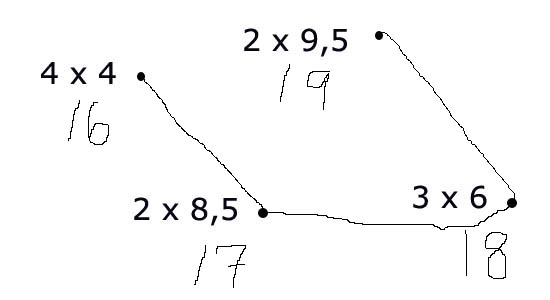
Math Mother May I
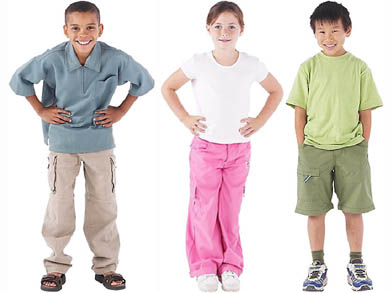 Playing Math Mother May I is just like
playing the regular game, but rather than telling them "5 baby
steps" or "2 giant steps", you give them problems to solve in
order to move forward a set number of steps.
Playing Math Mother May I is just like
playing the regular game, but rather than telling them "5 baby
steps" or "2 giant steps", you give them problems to solve in
order to move forward a set number of steps.
For
example, any math problem from the 1 to 5 times table is 3
regular steps, any problems from the 6 to 12 times table is 3
large steps, and any problem from the 13+ times tables will be
3 giant steps.
Ask them which problems they want, as
that gives them a chance to solve problems according to their
confidence in their math skills.
If they can't solve
the problem, they have to take that many steps backwards. The
person to reach the "Mother" first will be the winner.
Multiplication Around the World
Rather than playing Around the World with a basketball, use multiplication problems.
Set a specific number of spots each person needs to travel
to in order to win the game, and set all the players at the
beginning of the game.
Call out math problems to each
child and the ones that can solve the problems are able to
advance.
The children that fail to solve the problems
stay where they are until they can solve one correctly.
Multiplication Eggs
Colored eggs is a game where the "Wolf" calls out a
specific color, and the person with that color will have to
run around and avoid being caught.
Multiplication eggs
is slightly different, as each player is assigned a number 1
through 12, and the wolf has to do multiplication problems
using one of those numbers.
The people with the
numbers from the math problem have to run around and escape
capture, and a new number is assigned to them once they return
to the "Home".
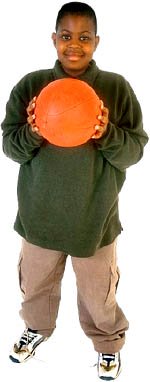 Multiplication Basketball
Multiplication Basketball
With your basketball game (two and three points per shot),
the person who scored the basket has to come up with a
mathematical equation that equals the number of points they
scored.
For example, scoring a three pointer would
force you to come up with an equation like 3 times 1, 1.5
times two, and so on. Each point scored will force the player
to come up with a new equation that equals the number of
points they have scored (6 times 5, 15 times 2, etc.), thus
forcing them to use their advanced multiplication skills.
These are a few multiplication math games that you can look into if you want
to help your child learn his or her multiplication skills.
While it may take time for them to improve their math, you
will find that these multiplication math games will help them
sharpen up quicker and much more enjoyably.
Your Positive Parenting Ally,
Birgitte

Want to stay in touch and get the latest news?
Sign up
for my free newsletter
Parent Coaching
- For Inner Peace, Clarity and a Deeper Connection to Your Child
 Being a parent can feel like a double-edged sword. Life with kids may feel like the greatest gift you have ever received, while at the same being hugely challenging, often leaving you confused, stressed and overwhelmed.
Being a parent can feel like a double-edged sword. Life with kids may feel like the greatest gift you have ever received, while at the same being hugely challenging, often leaving you confused, stressed and overwhelmed.
When we feel like this, we've lost touch with ourselves. We can't hear our own inner voice, and it's difficult to know what is 'right' for us and how to act.
I offer in-depth parent coaching to help you regain your balance and get back in touch with yourself. From a place of inner peace and clarity, your will find your own answers which will help you reconnect with your child from a place of unconditional love and acceptance.
Read more about my parent coaching here.
Where Would You Like to Go Next?
Fun Math Games for Kids
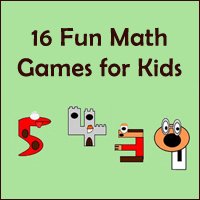 Exciting Math for Kids 16 Fun Math Activities and Counting Games. |
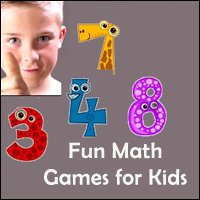 Educational Kids Math Games Cool Math Websites and Physical Fun Math Activities. |
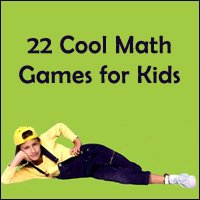 22 Cool Math Games for Kids Fun Math Activities with Multiplication, Addition and Subtraction. |
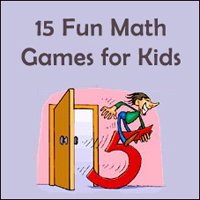 15 Fun Math Games for Kids: Turning Multiplication, Addition and Fraction into Fun Math Activities. |
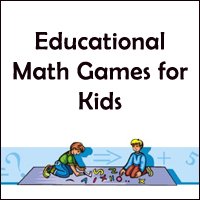 Cool Math Games for Kids and Fun Math Activities for All Ages. |
Fun Science Games and Experiments for Kids
 27 Learning Games for Kids A List of the Best Educational Games for Kids. |
 15 Fun Science Projects for Kids - Fun Learning Games at Home. |
 14 Fun Science Experiments for Kids: Guidelines for Kids Science Projects and Learning Games. |
 14 Science Fair Projects for Kids: Easy Guidelines to Fun Science Fair Ideas. |
 12 Fun Experiments for Kids: Easy Science Projects for Kids to Do at Home or in School. |
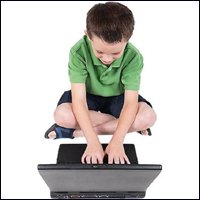 36 Recommended Science Websites for Kids: Science Sites for Kids That Make Learning Fun. |
 Fun Facts about the Solar System for Kids and Fun Kids Astronomy Games. |
Back to the top of this page about Fun Multiplication Math Games and Educational Times Tables Activities for Kids
Go to the Positive Parenting Ally Homepage







